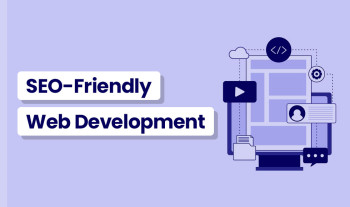How to Choose the Best Web Development Framework for Your Project
Choosing the right web development framework for your project is a critical decision that can significantly impact the success and efficiency of your development process. With numerous frameworks available, each with its own strengths and weaknesses, it's essential to make an informed choice. In this blog, we'll guide you through the key factors to consider when selecting the best web development framework for your project. If you're looking for expert advice and top-notch development services, consider partnering with the best web development company to ensure your project's success.
Understand Your Project Requirements
Before diving into specific frameworks, it's crucial to have a clear understanding of your project requirements. Consider the following aspects:
Project Complexity: Is your project a simple website, a complex web application, or an enterprise-level solution?
Scalability: Will your project need to handle a large number of users or data in the future?
Performance: Are there specific performance requirements, such as fast load times or high concurrency?
Budget and Timeline: What are your budget constraints and project deadlines?
Team Expertise: What skills and experience does your development team have?
Evaluate Popular Web Development Frameworks
Here are some of the most popular web development frameworks to consider, each with its own set of features and benefits:
React: A JavaScript library maintained by Facebook, ideal for building dynamic and interactive user interfaces. It offers a component-based architecture and excellent performance.
Angular: A robust framework developed by Google, suitable for building large-scale applications. It provides a comprehensive set of tools and features for building single-page applications (SPAs).
Vue.js: A progressive JavaScript framework that is easy to integrate into existing projects. It offers flexibility and a gentle learning curve.
Django: A high-level Python framework known for its simplicity and rapid development capabilities. It includes built-in features like authentication and ORM (Object-Relational Mapping).
Ruby on Rails: A popular Ruby framework that emphasizes convention over configuration. It's well-suited for building database-backed web applications.
ASP.NET Core: A cross-platform framework developed by Microsoft, ideal for building modern, scalable web applications. It supports multiple programming languages, including C# and F#.
Consider Performance and Scalability
Performance and scalability are crucial factors for any web project. Evaluate how each framework handles:
Load Time: How quickly does the framework render web pages and handle user interactions?
Concurrency: Can the framework efficiently manage multiple simultaneous users?
Caching: Does the framework support caching mechanisms to improve performance?
Database Management: How well does the framework interact with databases and manage data efficiently?
Analyze Community Support and Documentation
A strong community and comprehensive documentation can significantly ease the development process. Look for frameworks that:
Have Active Communities: A vibrant community can provide support, plugins, and third-party tools.
Offer Extensive Documentation: Well-documented frameworks make it easier to understand and implement features.
Provide Regular Updates: Active maintenance and updates ensure the framework remains secure and up-to-date.
Assess Security Features
Security is paramount in web development. Ensure the framework you choose:
Offers Built-In Security Features: Look for features like CSRF protection, XSS prevention, and secure authentication mechanisms.
Follows Best Practices: The framework should adhere to industry-standard security practices and guidelines.
Evaluate Development Speed and Ease of Use
Consider how quickly you can develop and deploy your project using the framework. Factors to assess include:
Learning Curve: How easy is it to learn and start using the framework?
Development Tools: Does the framework offer tools and libraries to speed up development?
Testing Capabilities: Does the framework provide built-in testing tools or support third-party testing frameworks?
Choosing the best web development framework for your project involves careful consideration of your project's requirements, the framework's performance, scalability, community support, security features, and ease of use. By thoroughly evaluating these factors, you can make an informed decision that aligns with your project's goals and constraints. For expert guidance and top-tier development services, partnering with the best web development company can ensure your project is executed flawlessly, delivering high-quality results.
For more insights and professional assistance, reach out to the best web development company and transform your vision into reality.










